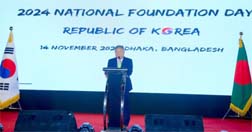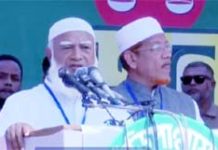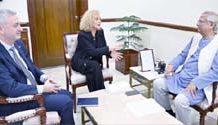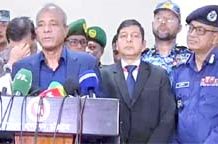C T Online Desk: Korean Ambassador to Bangladesh Park Young-sik has said his country wants to be a crucial partner for Bangladesh in its infrastructural advancement to make its economy more resilient and sustainable.
“Bangladesh requires further infrastructure development to make its economy more resilient and sustainable. Korea aspires to become a vital partner in Bangladesh’s infrastructure advancement,” he said while addressing a programme marking 2024 National Foundation Day of Korea on the embassy premises in the capital on Thursday.
He said currently, numerous projects are under discussion through the Economic Development Cooperation Fund, soft loans from the Korean government, or the Public-Private Partnership mechanism.
“It is my sincere hope that ongoing projects will make smooth progress and greatly contribute to the development of infrastructure in Bangladesh.”
He stated about the immense opportunities and challenges of the future Bangladesh as the country is marching towards graduation from the LDC status in 2026.
“Bangladesh has shown great potential, as evidenced by the tripling of Bangladesh’s per capita income over the last decade. However, the post-LDC graduation phase will require considerable efforts from both the government and the private sector to overcome a lot of challenges which the LDC graduation would cause in a few years to come.”
Park Young-sik also said that graduation from the LDC status means that Bangladesh should focus not just on the quantity but also on the quality of its economic growth.
The quality must be driven by innovation, knowledge, and technology areas where foreign companies can make substantial contributions and this is why Bangladesh needs foreign direct investment, he said.
“At the economic seminar which the Korea embassy and the Foreign Investors’ Chamber of Commerce and Industry co-hosted on 3 November, Korean companies demonstrated its strong will to make continuous investment in Bangladesh, demanding a better business environment for foreign investors.”
Terming Bangladesh a key priority partner country for Korea’s development cooperation efforts, the ambassador said the country currently ranks third among Korea’s ODA recipients.
Park Young-sik said, “Korea has taken an active role in implementing development projects across multiple sectors, including education, technical training, health, ICT, and etc.”
He mentioned how Korea has been standing beside the Rohingya community in Bangladesh with humanitarian assistance since 2017.
It is worth mentioning that Korea has annually provided humanitarian aid of $3-$5 million for the Rohingyas and their communities in Bangladesh, and the funding for humanitarian aid was increased to $10 million this year.
He recalled how Korea has been contributing to the development of Bangladesh’s ready-made garment industry since 1979.
“Korea’s investment in Bangladesh has become the fourth largest in terms of accumulated amount. Notably, there has been an increase in investment in manufacturing industries such as automobiles, mobile phones, and consumer electronic goods through joint ventures with local partners. These companies are creating good quality jobs through domestic production.
“The success story in Korean investment is the establishment of the first country-specific private Export Processing Zone, KEPZ, in Chattogram. The KEPZ is currently exporting roughly $1.25 billion and employing 70,000 workers. I hope that the KEPZ will continue to serve as a flagship symbol of the Korea-Bangladesh business ties.”
Current bilateral trade between Korea and Bangladesh stands at approximately $2.6-$3 billion. The two nations agreed to start the negotiation of a bilateral Economic Partnership Agreement. The ambassador expected that this EPA would further enhance trade and investment in mutually beneficial ways.
Korea has become a hub for Bangladeshi migrant workers. Since 2008, more than 35,000 Bangladeshi workers have gone to Korea under the Employment Permit System (EPS).
Speaking about this, Park Young-sik said, “The Korean government is committed to ensuring that migrant workers have safe and comfortable working conditions, whereas Bangladeshi workers must improve their Korean language skills.”
He urged all to renew commitment to each other and take a bold step forward for a closer, deeper, stronger, and brighter future in the next 50-year journey of Korea and Bangladesh.














